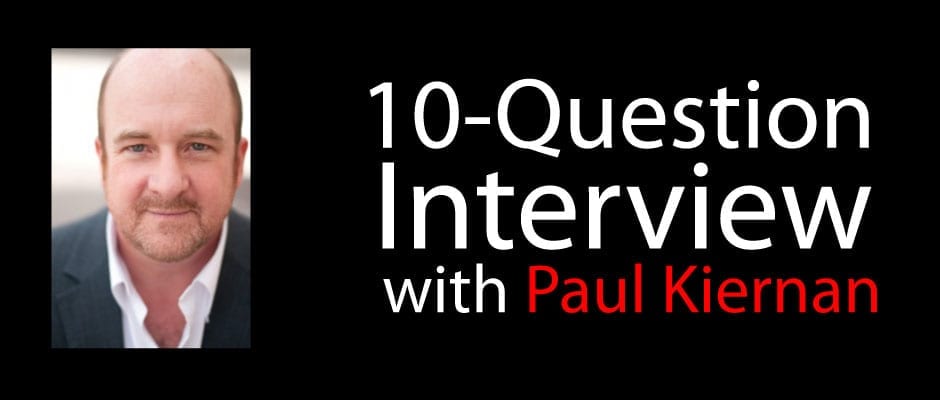
Longtime Utah audiences may recognize actor Paul Kiernan. Recently, Kiernan has been seen in Salt Lake City in the landmark role of Falstaff in Henry IV, Part 1. The UTBA reviewer who saw that show said, “I hardly expected Paul Kiernan to steal the show by playing this role with such charisma and joviality.” Similarly, a different UTBA reviewer who saw Kiernan’s performance in Pioneer Theater Company’s Hamlet wrote, “Paul Kiernan is a joy as the sharp-witted gravedigger: he is one of the few characters who speaks frankly with Hamlet, and his candor is very welcome.” Given the praise that his performances have received from some of our best reviewers, it became clear that we needed to make Kiernan our subject of our next 10-question interview.
1. What is your title?
Actor
2. What show/shows are you currently working on?
Currently prepping auditions for RED at Orlando Shakespeare Theater and doing prep work for The Tempest with the Pioneer Theater Company, will be playing Caliban.
3. In one sentence, describe your job.
Telling stories, creating real, believable characters and entertaining.
4. What skills are necessary for a person in your position?
Well, there are a lot of skills an actor needs. A good knowledge of history. Understanding of language. Basic acting skills. It is kind of difficult to pin point what an actor needs. A sense of play, of trust. A desire to tell stories clearly and passionately. A love of community. An understanding of the human psyche and what makes a person tick. A fearlessness that allows you to explore the darker sides of the human animal.
5. What kind of training did you go through to get to your position?
Undergrad degree in acting, MFA in acting and directing. Years of experience on stage and in front of cameras. Improv companies, writers workshops … everything is a possible addition to an actors tool kit. Learning to really listen, look and learn. I had exceptional teachers who instilled the need and desire to make clear, active choices. To find the unity of opposition in a character and to never take anything for granted when you are working. Dig deeper. Ask more questions.
6. What was your first job in theater?
So long ago I have no idea. I am sure it was a play at a community theater somewhere.
7. Why do you think theater is important?
Theater asks the audience to be involved. Television and film allow the audience to sit and watch. With live theater, the audience is the final piece in the performance. The actors on stage hear, feel and understand the audience and it effects the production. This isn’t just in a comedy, the laughter, but in all forms of the art. The piece of theater is not complete until the audience arrives and absorbs, accepts, witnesses the final outcome. Stories are told to someone so that they can continue the thread of life. If there is no audience in the theater, then the play, the story, the need is not complete and the moment is unfulfilled. It is a living thing, live theater, and it can only live if all it’s components are functioning. The audience is important for the theater and the theater is important for our culture.
8. What is your profession’s greatest challenge today?
Getting people interested in and involved in live theater. The theater has become a bit of a sport for the elite. High ticket prices are keeping the average person away. We also need to keep the world of live theater and film more separate … there are so many shows now on Broadway that are basically films on stage. Huge special effects and lavish sets are diminishing the need for a clear story. For simple talking and listening. Audiences do not seem to want to see a play if it doesn’t have known movie stars in it or it is a huge spectacle. We need to challenge or writers, actors, directors, producers, designers to return to simple, clear, engaging story telling once again.
9. If you could change just one thing about the industry with the wave of a magic wand, what would it be?
I would wave my magic wand and have the arts subsidized by the government like they are England. I would make the arts more accepted, more legitimate and more accessible to the general public. I would restore the place of live theater in the day to day lives of Americans.
10. What advice would you give to someone who wanted to do what you do?
Train. Train. Train. Read. Not just books about acting or theater but literature and science. History and math. Our job is to portray the world so, have a good knowledge of what the world is about. Do not be myopic in your world. Do not spend time with only actors, only performers. Live outside of the art so that you can bring life to the art. Do not mistake being good at karaoke for being an actor. Do not think because you like to be the center of attention that people want you to be so. Read plays. Take classes. Never stop seeking new ways to approach the work. And, above all, respect the art.
